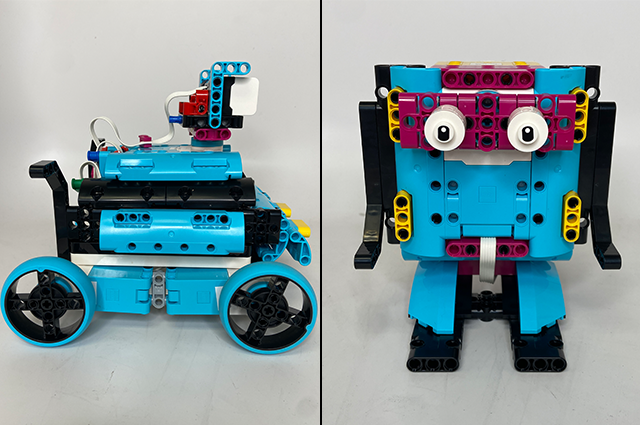Dinésh chįįn: A new word for robot

Collaborative approaches to STEM learning are at the heart of the Tufts Center for Engineering Education and Outreach (CEEO)’s work. In keeping with this philosophy, the Playful Engineering-Based Learning (PEBL) initiative, a LEGO Foundation grant administered by Tufts CEEO, provides established local educators and leaders with the necessary resources to meaningfully integrate engineering exploration in their communities. Rather than delivering educational programs with a one-size-fits-all strategy, PEBL leverages the knowledge and experience of local experts and grassroots organizations to consider the nuances of each individual community and supports educators in ways that are tailored to their particular needs. Working with eight partner organizations scattered across the globe, PEBL seeks to bolster playful engineering education while serving the needs of the community.
Equitable partnership is at the heart of the PEBL initiative, and the collaboration with the Ke’yah Advanced Rural Manufacturing Alliance (KARMA) is no different. Established in 2015 and incorporated as a nonprofit in 2020, KARMA works with the Navajo Technical University, Navajo Tech Innovation Center, and a consortium of other universities, incubators, and manufacturers. The group helps fuel the growing strength of advanced manufacturing in Navajo Nation, which spans 27,000 square miles across the states of New Mexico, Arizona, and Utah. With a variety of programs and initiatives for all ages, KARMA offers technical expertise and equipment that encourages people to explore and pursue advanced manufacturing within Navajo Nation.
Since first partnering with KARMA in 2021, PEBL has supported the continued integration of Navajo priorities, language, beliefs, and history into culturally relevant pre-college engineering curricula and “MakerPlaces.” Similar to a makerspace, KARMA refers to these facilities as MakerPlaces to center the important relationship between place and community in Navajo culture. The grant supports PEBL Fellows Jamie Adams, Mykl Green, Denise Masayesva, and Thomas Tomas as they develop playful engineering pedagogy tailored to educational environments in Navajo Nation and Hopi Nation. The program’s effectiveness can be attributed to its grassroots nature. KARMA celebrates and draws from Navajo culture and life from the start, developing effective and appropriate programming that embodies Navajo values and serves community needs.
The KARMA team empowers students to integrate their knowledge of STEM subjects with their culture and their native language. To that end, KARMA’s cultural committee, which is a collective of cultural representatives that assist in cultural integration, created a word for ‘robot’ in Diné Bizaad, also known as the Navajo language. That word for robot, dinésh chįįn, combines the terms for ‘human’ (dinésh) and likeness (chįįn) in the same way that the Navajo word for ‘doll’ (awéésh chįįn) combines ‘baby’ (awéésh) with ‘likeness’. The new word helps students view robotics within the context of their own culture and identity, in the face of STEM fields that overwhelmingly utilize terms from Western culture and tradition to describe the scientific names of plants, animal species, constellations, and planets.
Diné Bizaad has persevered despite centuries of relentless efforts to eliminate it. From the 1860s to 1978, boarding schools harshly enforced English-only policies. Despite the eradication of the boarding schools in 1978, continued generational trauma, legally enforced English immersion classes, and the greatly diminished Navajo-speaking population continue to present challenges to teaching and learning the Navajo language, which UNESCO has designated as a potentially vulnerable language.
In the future, KARMA hopes to add more terms to the Navajo vocabulary, including words to describe 3D printing that draw from the long history of weaving in Navajo culture. In a recent blog post from the CEEO, Dr. Ben Jones, president and CEO of KARMA, explained that creating Navajo terms for STEM concepts helps make these 21st century technologies feel relevant to students within the context of their culture. He and the rest of the KARMA team plan to continue blending Navajo culture with STEM topics to foster technical expertise and opportunities within Navajo Nation.
In addition to its work with KARMA in Navajo nation, the PEBL program supports local outreach organizations in Nepal, Rwanda, and the U.S. states of Illinois, Missouri, and New Hampshire. The PEBL work arose from Tufts CEEO work on The LEGO Foundation Tech and Play initiative, which seeks to prepare students to be the next generation of changemakers. Tufts CEEO also supports programs in Brazil, Kenya, and Rwanda as part of the initiative. With play-based engineering programs in multiple nations, PEBL is committed to bringing playful engineering curricula to students in K-16 environments.
As one of the first centers in the U.S. dedicated to engineering education, Tufts CEEO is paving the way to an inclusive engineering future. Implementing culturally relevant engineering education maximizes the benefits of increasing access to technology in the largely rural Navajo nation. Tufts CEEO leverages its cutting-edge research in the learning sciences and acts as a bridge to support educators as they, in turn, design and support student learning.
Learn more about the project and about KARMA’s work on Tufts CEEO blog.
Department:
Center for Engineering Education and Outreach